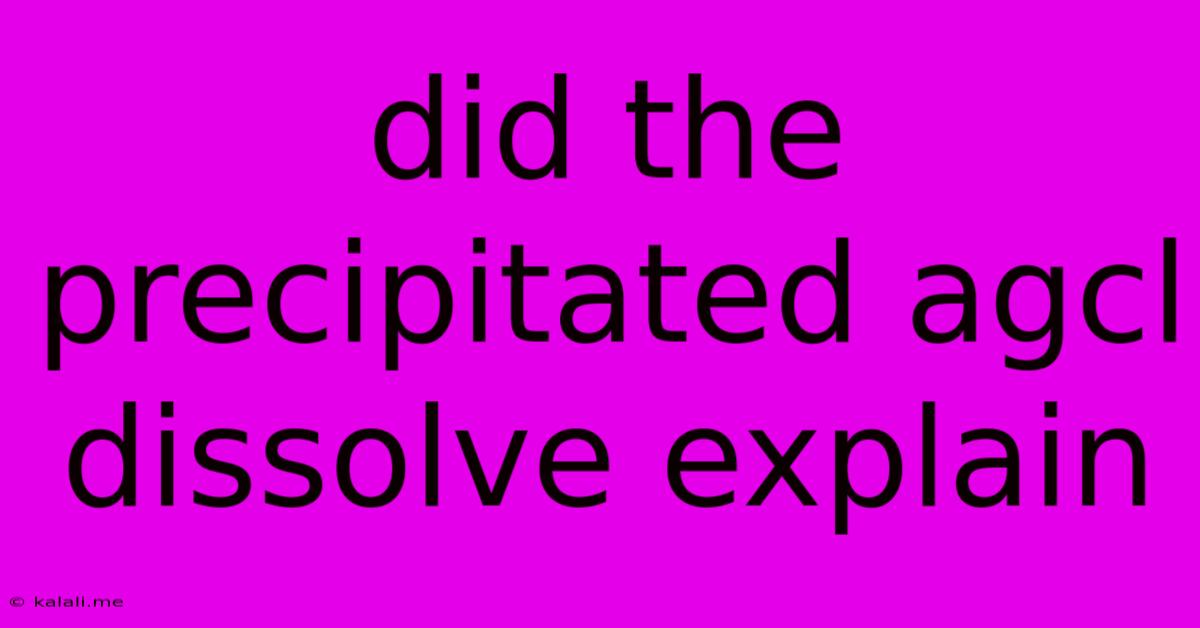Did The Precipitated Agcl Dissolve Explain
Kalali
May 31, 2025 · 3 min read

Table of Contents
Did the Precipitated AgCl Dissolve? Understanding Solubility Equilibria
This article explores the question of whether precipitated silver chloride (AgCl) dissolves, delving into the principles of solubility equilibria and the factors influencing its solubility. Understanding this is crucial in various fields, from analytical chemistry to environmental science. We'll examine the conditions under which AgCl might redissolve, explaining the underlying chemistry involved.
The Basics: AgCl Precipitation and Solubility Product
Silver chloride is known for its low solubility in water. When solutions containing silver ions (Ag⁺) and chloride ions (Cl⁻) are mixed, a white precipitate of AgCl forms. This precipitation is governed by the solubility product constant, Ksp. The Ksp for AgCl is a very small value (around 1.8 x 10⁻¹⁰ at 25°C), indicating that only a minuscule amount of AgCl dissolves in pure water. The equilibrium reaction is:
AgCl(s) ⇌ Ag⁺(aq) + Cl⁻(aq)
Ksp = [Ag⁺][Cl⁻]
Factors Affecting AgCl Dissolution
While AgCl's inherent low solubility is significant, several factors can influence whether precipitated AgCl will dissolve to any appreciable extent:
1. Common Ion Effect
The presence of a common ion, either Ag⁺ or Cl⁻, significantly reduces the solubility of AgCl. Adding more chloride ions (e.g., from a concentrated solution of NaCl) will shift the equilibrium to the left, forcing more AgCl to precipitate out of solution. Conversely, adding more silver ions will have the same effect. This is a direct consequence of Le Chatelier's principle.
2. Complex Ion Formation
The formation of soluble silver complexes can dramatically increase AgCl solubility. Ligands such as ammonia (NH₃) or thiosulfate (S₂O₃²⁻) can react with Ag⁺ to form complex ions like [Ag(NH₃)₂]⁺ or [Ag(S₂O₃)₂]³⁻. These complexes are significantly more soluble than AgCl, effectively removing Ag⁺ from the solution and shifting the equilibrium to the right, dissolving more AgCl.
3. pH Changes
While not as direct as the common ion effect or complex formation, pH can indirectly influence AgCl solubility. Changes in pH can alter the concentration of other ions in solution, potentially impacting the equilibrium. For instance, in highly acidic solutions, some competing reactions might occur, though the effect on AgCl solubility is generally less pronounced than the effects of common ions or complexation.
4. Temperature
Increasing the temperature generally increases the solubility of most solids. While the effect on AgCl is relatively small, higher temperatures will slightly increase the concentration of dissolved Ag⁺ and Cl⁻ ions.
In Summary: When Does AgCl Dissolve Appreciably?
Precipitated AgCl will only dissolve to a significant extent under specific conditions. These conditions generally involve the presence of:
- A ligand that forms a stable soluble complex with Ag⁺: This is the most effective way to dissolve AgCl.
- An extremely low concentration of both Ag⁺ and Cl⁻: While unlikely in most situations, the absence of common ions allows for a slightly higher solubility than in the presence of excess Ag⁺ or Cl⁻.
In the absence of these conditions, the very low Ksp of AgCl means that the amount of dissolution will remain negligible. Understanding these equilibrium principles is crucial for interpreting experimental results and manipulating chemical reactions. Therefore, whether precipitated AgCl dissolves depends heavily on the specific conditions of the system.
Latest Posts
Latest Posts
-
Where There Is A Dead Body The Vultures Will Gather
Jun 02, 2025
-
Is Delta H Positive Or Negative In An Endothermic Reaction
Jun 02, 2025
-
How To Prevent Loss Overflow In Bf16
Jun 02, 2025
-
How To Prove A Limit Exists
Jun 02, 2025
-
How To Fix Water Hammer In Shower
Jun 02, 2025
Related Post
Thank you for visiting our website which covers about Did The Precipitated Agcl Dissolve Explain . We hope the information provided has been useful to you. Feel free to contact us if you have any questions or need further assistance. See you next time and don't miss to bookmark.